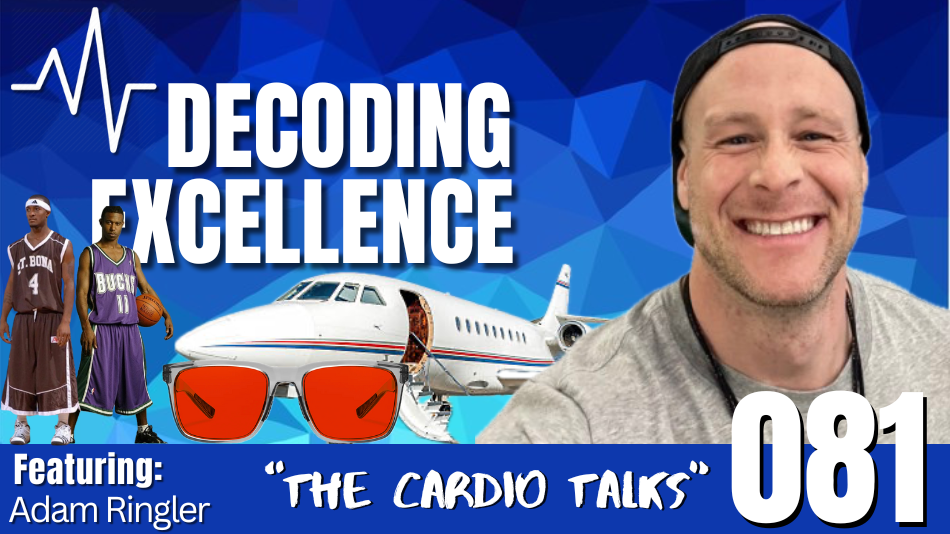#081 - Building Stronger Women’s Basketball Athletes & Beating Travel Fatigue in College Hoops
Women’s basketball is faster and more physical than ever—athletes need real strength training, not just light circuits. Add in the grind of cross-country travel, and managing fatigue becomes critical. This post breaks down how to build power, resilience, and travel-ready performance.

In this raw and unfiltered Cardio Talk edition of the Decoding Excellence Show, I dive into two topics that are reshaping the way we think about performance in college athletics.
1️⃣ First up: The Evolution of Women’s Basketball Training. The women’s game has grown more physical, more explosive, and more demanding than ever before. Yet too often, strength coaches still program light, cautious workouts—more bands and calisthenics than barbells and heavy loads. In this conversation, I break down why that approach sells athletes short, and why the modern women’s basketball player needs real weight training, exposure to grinding lifts, and intentional preparation for the realities of elite competition. If we’re serious about preparing athletes for the court, then our training has to meet the actual demands of today’s women’s game.
2️⃣ Second: Managing Travel Fatigue in College Hoops. The reality of long flights, late nights, and back-to-back games across time zones takes a massive toll on player readiness and performance. I outline five science-backed strategies to help athletes handle travel stress: controlling light exposure, prioritizing hydration, timing meals around the body clock, moving early and often, and protecting sleep quality. These simple adjustments can give athletes the edge they need to stay sharp, recover faster, and perform when it matters most.
This ruck walk conversation is all about cutting through the fluff and talking shop—strength training that truly prepares women’s basketball athletes, and practical tools for optimizing performance on the road. No script, no edits—just real talk about what works.
Tune in, share with a fellow coach, and let’s keep pushing the field forward.

Click HERE to Join our FREE Broadcast Channel over on Instagram! 📣

🏀 Evolution of Women’s Basketball Training
Over the last two decades, women’s basketball has transformed into a game that is faster, more physical, and undeniably more explosive. Athletes are stronger, more skilled, and expected to perform at higher intensities across longer seasons with demanding schedules. This shift has forced strength and conditioning coaches to rethink the way we prepare our players. It’s no longer enough to stick with “safe” programming—bodyweight exercises, bands, and light circuits won’t cut it. Today’s women’s basketball athletes need robust training strategies that reflect the true physical demands of their sport.
Unfortunately, there’s still a tendency in our profession to hold women’s teams back—whether intentionally or unconsciously—by underloading them in the weight room. Some coaches fall into the trap of thinking women should train with less intensity, as if they can’t or shouldn’t push heavy weight. That mindset not only limits performance, but also increases the risk of injury when athletes step onto the court against opponents who have been trained to handle contact, grind through fatigue, and produce power. The women’s game deserves the same respect and intentional preparation as the men’s side.
To truly evolve women’s basketball training, we need to embrace heavy lifting, expose athletes to real grinding efforts under the bar, and program with the same seriousness we’d apply to any elite-level sport. Developing force, improving resilience, and conditioning athletes to meet the realities of the game is our responsibility as strength coaches. When we prioritize power development, effective load management, and individualized programming, we empower athletes to rise to the challenge of today’s women’s basketball—fast, physical, and highly competitive.
✈️ Managing Travel Fatigue in College Hoops
The college basketball season is a grind, and nowhere is that more obvious than during travel. Between time zone changes, late-night flights, early morning practices, and long stretches in hotels, players are often asked to perform under conditions that work directly against their biology. Travel fatigue isn’t just about feeling tired—it’s about disrupted circadian rhythms, dehydration, poor sleep quality, and the cumulative wear and tear that dulls both body and mind. If left unaddressed, it can lead to diminished readiness, higher injury risk, and inconsistent game-day performance.
One of the keys to managing travel fatigue is proactivity. Athletes and coaches can make small but powerful adjustments before, during, and after travel that significantly improve performance outcomes. Simple strategies like controlling light exposure to sync the body clock, staying ahead of hydration needs in dry airplane cabins, and timing meals to align with local schedules all help accelerate adaptation to new environments. Likewise, encouraging movement during flights—stretching, ankle pumps, or short walks—keeps blood circulating and tissues primed for competition.
Equally important is protecting sleep quality. Tools like sleep masks, noise-canceling headphones, or neck pillows can turn chaotic travel into more restful downtime. Once at the destination, holding athletes accountable to consistent bedtime routines helps anchor circadian rhythms and speeds recovery. When combined, these small details create a big advantage—helping teams stay sharp during the toughest stretches of the season. Managing travel fatigue isn’t about eliminating stressors, but about controlling what can be controlled so athletes show up ready to compete at their best.
If you want to hear the full, unfiltered conversation, check out this episode of the Decoding Excellence Show—part of my Cardio Talk series where I take you behind the scenes of my thoughts during long ruck walks here in Boulder, Colorado.
Thanks again for listening to the Decoding Excellence Show! I appreciate all the support growing this Sport Science, Strength & Conditioning, and High-Performance Coaching resource. If you have taken anything away from the show, please login to iTunes and navigate to Decoding Excellence page and leave us a FIVE STAR ⭐⭐⭐⭐⭐ review.
If you haven't already, you can head over to AdamRingler.com/Newsletter and sign-up for my weekly newsletter. This is a newsletter for the curious. It's chalked full of interesting articles I've read through the week, things I'm exploring and finding fascinating through my week, and a collections of thought experiences and resources I've cultivated.

If any of the material resonates with you, I'd love for you engage with me at @AdamRingler

Join the Former Athlete Society!
I built a private community exclusively for former college athletes who want expert coaching, a competitive environment, and the structure they’ve been missing. Inside, you'll get:
✅ A community discussion board to connect & share wins
✅ A full classroom with education modules on training & performance
✅ A leaderboard to reward engagement & consistency
✅ A calendar for live coaching calls & Q&A sessions
🔥Join the Former Athlete Society! 🔥 I built a private community exclusively for former college athletes who want expert coaching, a competitive environment, and the structure they’ve been missing.


